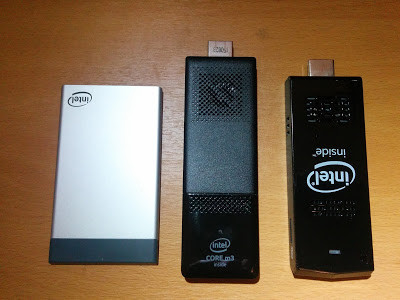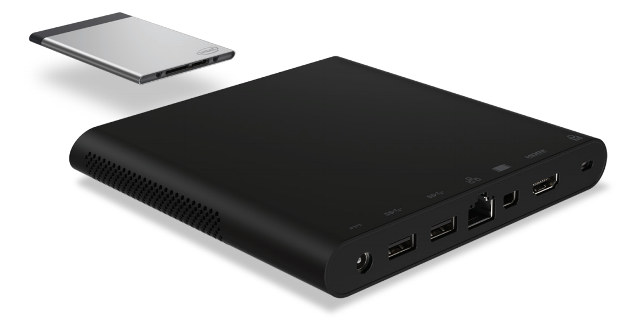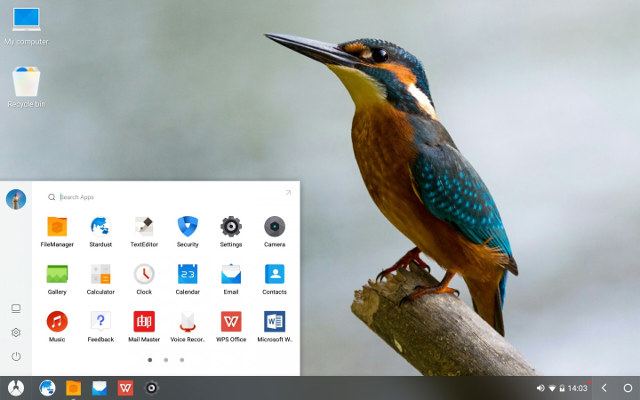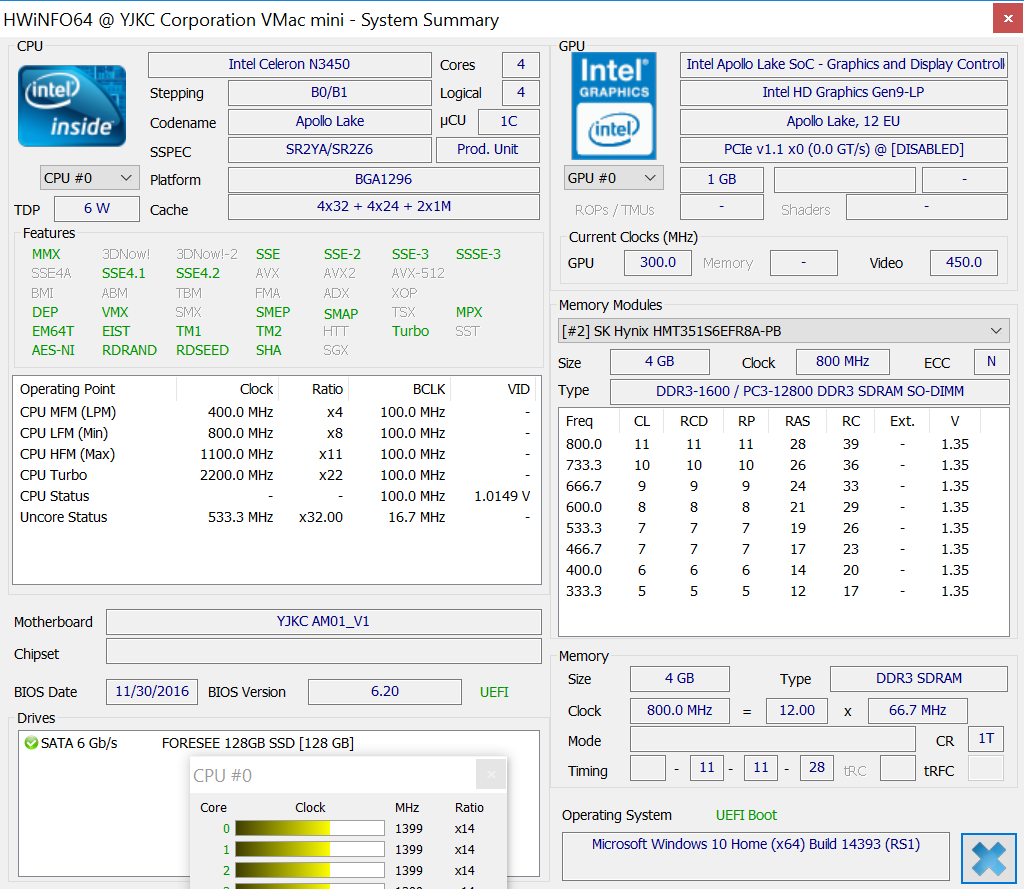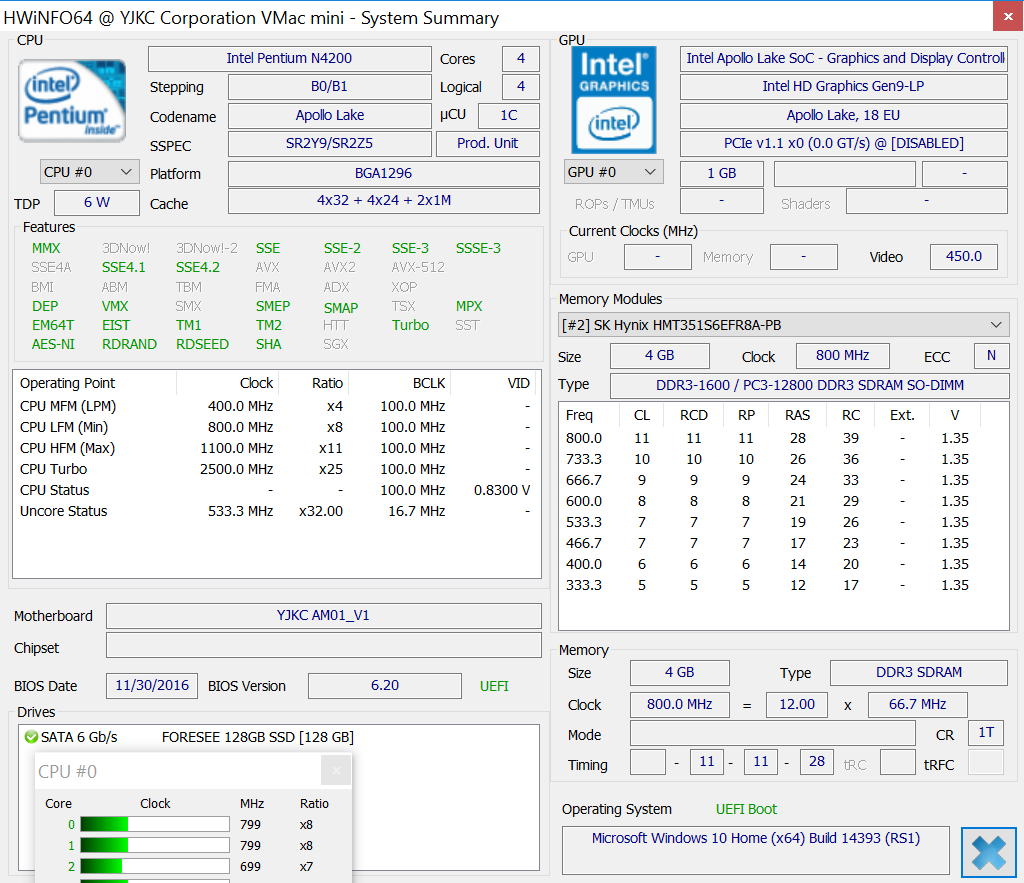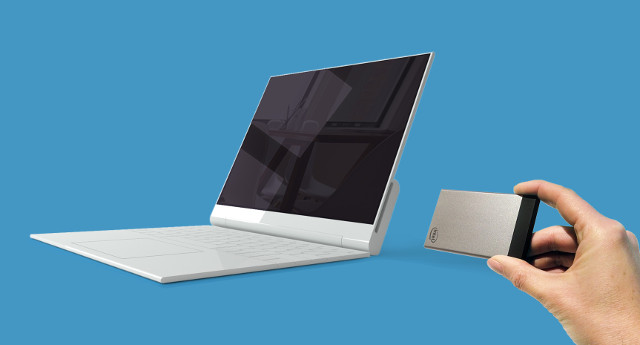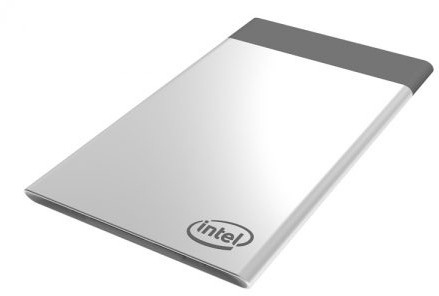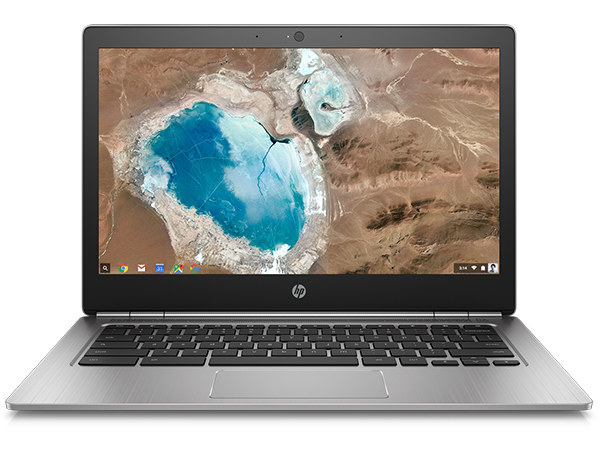We’ve recently seen Intel introduced Dock DK132EPJ for their Compute Cards, and released some pricing info. Ian Morrison (Linuxium) got sent a full kit by Intel with the dock and Compute Card CD1M3128MK powered by a dual core / quad Core m3-7Y30 processor with 4GB RAM, 128GB PCIe SSD, and Intel Wireless-AC 8265 module. You can get the full details in Ian’s post, but I’ll provide a summary of the key points here. While the compute card and dock are thinner than most product, the computer card is quite wider than TV sticks, and the dock larger than an Intel NUC. It also comes with a fan, and cooling works well with maximum CPU temperature under being 70°C. The Compute Cards do not come with any operating system, but you get to the BIOS easily, and install Windows or Linux distributions. Ian’s started with Windows 10 Enterprise Evaluation, and ran […]
Intel Compute Card Dock DK132EPJ Specifications and User Manual Published
Intel unveiled the Compute Card at the very beginning of the this year, without that many details, except it would included a 7th Gen Intel Core, memory, storage and wireless connectivity, and connect compliant dock with a new standard connector featuring USB-C and extra I/Os. Later this year, we learned more details about some Apollo Lake and Kaby Lake Compute Cards including specifications and block diagram. However those cards won’t be of any use without docks, and while NexDock promised a laptop dock for the cards, I have not seen any other announcements, but we now have some info about Intel’s own Compute Card dock that looks like a mini PC as the company released technical specifications and user manuals for DK132EPJ dock, and three Compute Card SKUs. Intel Compute Card Dock DK132EPJ specifications: CPU, Memory, Storage, Wireless – Via slot supporting certified Intel Compute Cards Video Output – HDMI and […]
Phoenix OS 2.1 Android 7.1 based Desktop OS Released for 32-bit and 64-bit x86 Platforms
With Jide’s announcement that they’d stop working on Remix OS for the consumer market, focusing on the enterprise market instead, people who like to use Android as a desktop OS lost an option. Luckily, others have not given up on the concept yet, and Phoenix OS 2.1 based on Android 7.1 with desktop improvements has just been released for computers based on Intel/AMD 32-bit and 64-bit x86 processors. Phoemix OS user interface is a mix between Windows desktop with a desktop, a taskbar, and a start menu, and Android with notifications, and Back/Home/Recent buttons. The OS also supports Android apps, multi-window, window resizing, better multi-tasking, and so on. Changelog for Phoenix OS 2.1: Keyboard mapping updates to version 2.5 with smart casting for Strike of Kings. The bug that window size won’t be saved after restart has been fixed. Enhance the hardware compatibility, including: sound card, network adapter, etc. “Start […]
Voyo VMac Mini mini PC Benchmarks with Intel Celeron N3450 Apollo Lake Processor
Following up yesterday’s post about Voyo VMac Mini mini PC benchmarks with Intel Pentium N4200 processor, I’ve switched to its cheaper little brother powered by Intel Celeron N3450 processor and performed the same benchmarks to compare the performance difference with the Pentium version, as well as older Braswell and Cherry Trail systems. I’ve run HWiNFO64 before running the benchmarks to get more details about computer, and especially the processor. Celeron N3450 is a quad core processor clocked at 400, 800, and 1,100 MHz, and up to 2.2 GHz in burst mode. It’s quite similar to Pentium N4200, except the later has a higher burst frequency (2.5 GHz), and a better GPU with 18 EU, instead of just 12 EU on the Celeron. My exact version of the processor is stepping B0/B1 with sSPEC SR2YA/SR2Z6. I forgot to comment about supported features compared to Cherry Trail and Braswell processors yesterday, and […]
Voyo VMac Mini mini PC (Intel Pentium N4200) Benchmarks
Since I’ve now received Intel Apollo Lake hardware with Voyo VMac Mini mini PCs, I’ve going to run some benchmarks with Pentium N4200 and Celeron N3450 processor to compare the performance against older generation low power mini PC based on Braswell and Cherry Trail processors. I’ll get started with the Pentium N4200 version that’s both more expensive and powerful. But before starting with the benchmarks, I’ve run HWiNFO64 to get a bit more info about the system, and the processor in particular. The processor is the quad core Pentium N4200 stepping B0/B1 with sSPEC SR2Y9/SR2Z5 clocked between 400 and 1,100 MHz, and up to 2,5 GHz in burst mode. It also comes with a 18 EU HD graphics Gen9-LP. IMHO, PCMark 8 Home Accelerated 3.0 is one of the best benchmark as it replicates typical use cases such as web browsing, video conference, light gaming, photo editing, and so on. […]
NexDock is Working on a Hybrid Laptop Dock for Intel Compute Cards
NexDock first launched a 14″ laptop dock for smartphones, tablets, and development boards via a Indiegogo campaign in 2016, where they successfully raised over $350,000, and delivered rewards to backers last September and October. With the recent introduction of the Intel Compute Card, the company has now decided to work on a new NexDock that will take Intel’s cards. We don’t have much details right now, but the company said that beside the Intel Compute Card, it will come support interchangeable USB type-C modules, and will still support Windows 10 smartphones with continuum feature, Raspberry Pi and other devices that can be connected through a USB-C port. The second drawing also suggests the keyboard will be detachable, and you’ll be able to use NexDock as a Windows tablet. It could be nice to have an Intel laptop with Linux or Windows, and an ARM tablet with Android, but this won’t […]
Intel Compute Card is a Business Card Sized Platform for Modular & Upgradeable Computers & Devices
Intel has just introduced their Compute Card, the name likely originating from their Compute Stick & Module series, integrating all main components you’d find in a computer such as a processor, memory, storage, and wireless connectivity into an standardized ultra thin business card sized module that can be used in compatible devices from smart kiosks to security cameras and IoT gateways, as well as computers and laptops. Intel has some demos at CES 2017, but has not announced any specific models yet. We still have some of the key features for the Compute Cards: Processor up to 7th Gen Intel Core, memory, storage and wireless connectivity are all included in the card Intel Compute Card-based device will provide the power, cooling and the optimized user I/O for that particularly solution Connection to devices will be done via an Intel Compute Card slot with a new standard connector (USB-C plus extension) […]
HP Chromebook 13 G1 Features Skylake Pentium or Core M Processor, 4 to 16GB RAM, and a 3200×1800 Display for $499 and Up
HP Chromebook 13 G1 is the middle ground between Google’s $1000 Chromebook Pixel and the cheap Rockchip RK3288 chromebooks, thanks to a choice of low power Skylake Core M processor, plenty of memory, and for people who loathe 1366×768, or even 1920×1080 displays, a 13.3″ display with 3200×1800 resolution. HP Chromebook 13 G1 specifications: SoC (four options) Intel Pentium 4405Y dual core / quad thread processor @ 1.5 GHz with Intel HD Graphics 515 GPU @ 300/800 MHz (TDP: 6W) Intel Core m3-6Y30 dual core / quad thread processor @ 900 / 2.2 GHz with Intel HD Graphics 515 GPU @ 300/850 MHz (TDP: 4.5W) Intel Core m5-6Y57 dual core / quad thread processor @ 1.1 / 2.8 GHz with Intel HD Graphics 515 GPU @ 300/900 MHz (TDP: 4.5W) Intel Core m7-6Y75 dual core / quad thread processor @ 1.2 / 3.1 GHz with Intel HD Graphics 515 GPU @ […]


